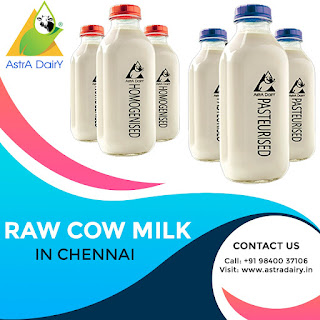The benefits of cow's milk for children
The benefits of cow's milk for children
Doctors emphasize that both cow's milk and other dairy products constitute a complete and balanced food group for small
Cow's milk was for decades one of the most valued
products for children's nutrition. However, in recent years many voices have
been raised to point out alleged risks and problems derived from its
consumption. This article refers to the relationship between cow's milk and
children, what are the benefits of its intake, what quantities are recommended
for the different stages of development and whether its intake can be
associated with different risks or difficulties.
Cow's milk and children
Cow 's milk provides numerous benefits to children. It
is contraindicated during the first 12 months of life, but, after they are one
year old, as reported by the Breastfeeding Committee of the Pediatrics (AEP),
healthy children can drink cow's milk without any problem and in this way, take
advantage of its nutrients.
Both the AEP and the World Health Organization and
other organizations recommend that, if possible, breastfeeding be the exclusive
feeding of the baby during its first semester of life and, then, extend it to
at least one year. During the second semester, although the little ones still
should not drink cow's milk, they can start eating dairy derivatives and
products that include cow's milk proteins, as long as the allergic risk is low.
Doctors even advise giving children cow's milk before
formulas called growth, junior or type 3 , which companies market as special
for this stage. A report from the European Food Safety Authority (EFSA),
published in 2013, highlighted that such preparations do not provide any
nutrients that children cannot obtain through a healthy and natural diet. It
could even have harmful effects, since excessive intakes could occur, as a
result of the introduction of some component without due control.
What benefits does cow's milk have for
children?
Milk is one of the main sources of calcium, the most
abundant mineral in the human body, essential in the formation of bones and
teeth. And not only that. "The consumption of milk and dairy products
improves the overall quality of the diet, especially calcium, potassium,
magnesium, zinc, vitamins A and D, riboflavin and folate," For this
reason, these experts point out that "milk and other dairy products
constitute a complete and balanced group of foods ", since -they add-
"their proteins (casein and whey proteins) are of high biological value,
they provide carbohydrates carbon (lactose), fats and fat-soluble vitamins”.
The AEP details that cow's milk and its derivatives
are not the only possible sources of calcium. Also, fish, egg yolks, vegetables
such as spinach and green beans, legumes, cereals and nuts make important
contributions in this regard. But few of these foods outperform dairy products,
because they offer "a high nutrient content in relation to caloric
content," as Moreno Villares and Galiano Segovia point out. And besides,
other foods are generally much more difficult to give to young children than
milk.
Among the long-term benefits of cow's milk
consumption, these experts report that it "reduces the risk of
osteoporosis, by increasing the acquisition of bone mass during growth,
decreasing bone loss with age and reducing osteoporotic fractures." And,
on the other hand, the adequate intake of these products "seems to have a
protective effect against the development of arterial hypertension."
Cow milk in Dealers in Chennai
How much cow's milk should children drink?
As Moreno Villares and Galiano Segovia describe in
their text, published by the Society of Extra-Hospital Pediatrics and Primary
Care (SEPEAP), two daily servings of milk and dairy products are recommended
during early childhood; between two and three, for children of school age; and
between three and four, for adolescents. How much is a daily ration? It is
equivalent to between 200 and 250 milliliters (ml) of milk or 125 ml of yogurt
or a piece of between 40 and 50 grams of cured cheese.
On the other hand, as reported by the National Library
of Medicine of the United States, the cow's milk recommended between the year
and two years of the child's life is whole, since the fat it contains
contributes to the development of the brain. And, from the age of two,
"children can drink low-fat or even skimmed milk, if they are overweight,"
the document indicates.
The consumption of cow's milk, does it
imply any risk?
In recent years, for reasons not fully known, we have
witnessed a smear campaign against cow's milk, attributing harmful effects to
health. Those alleged harmful effects range from allergy to lactose or milk
proteins to increased risk of asthma, autism spectrum disorders, cardiovascular
disease, and cancer. The risk of these allergies has been shown to exist, but
experts consider it "unlikely" to find an association between milk
consumption and other problems and diseases.
With regard to allergies, there are several
recommendations to prevent them, enunciated by the European Society of
Pediatric Gastroenterology, Hepatology and Nutrition (ESPGHAN), the Pediatric
Section of the European Academy of Allergology and Clinical Immunology (EAACI)
and other organizations. The most important ones are:
Whenever possible, make breastfeeding the baby's
exclusive diet during the first semester and extend it, at least, until one
year of life.
Include dairy products in the mother's diet during
pregnancy and lactation, as well as other products considered allergenic (fish,
eggs, etc.), in addition to ensuring that her diet is natural, healthy and
balanced.
If a supplement is needed for breastfeeding, resort to
formulas adapted from cow's milk, unless family history determines a high risk
of allergy to cow's milk proteins.




Comments
Post a Comment